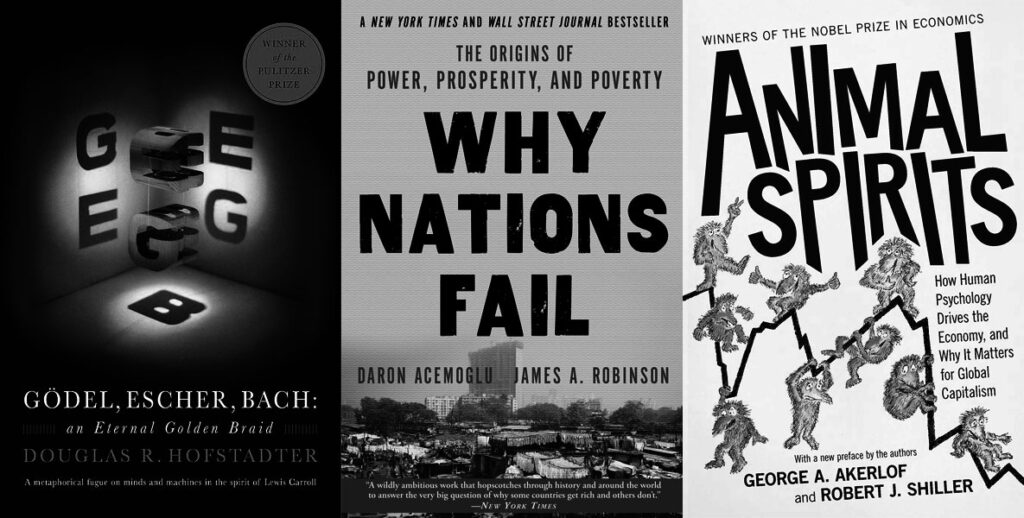
A PPE reading list
Few of us have the opportunity to study philosophy, politics, and economics at leading institutions. But that shouldn’t stop us engaging with and enjoying such topics. This post contains a reading list for studying undergraduate philosophy, politics, and economics (PPE) at the London School of Economics (LSE) and the University of Oxford for your perusal. I sourced this list from the institutions and colleges’ websites, favouring general interest books over textbooks for happier reading. Here’s hoping you might find something you’ll enjoy!
Jump ahead:
Philosophy
Classics:
- David Hume, 1748, An Enquiry Concerning Human Understanding: On the ‘species’ of philosophy, to topics on probability, liberty, and the reason of animals. (Available for free at Gutenberg)
- Bertrand Russell, 1912, The Problems of Philosophy: A classic introduction to philosophy — From topics on appearance and reality to error and probable opinion. (Available for free at Gutenberg)
Logic:
- Volker Halbach’s The Logic Manual (2010), Brian Skyrms’ Choice and Chance (1966) and Wilfred Hodges’ Logic (2001): ‘Textbook’ introductions into logical reasoning (Halbach lecture slides are also available online).
- R.M. Sainsbury, 2009, Paradoxes: An introduction to a series of paradoxes (each of increasing difficulty) and philosophical reasoning.
General interest:
- Daniel Dannett, 2014, Intuition Pumps and Other Tools for Thinking: A book of thinking tools and thought experiments for philosophising.
- Karl Popper, 1963, Conjectures and Refutations: A theory on scientific knowledge and discovery, with applications for history and politics.
- Douglas Hofstadter, 1979, Gödel, Escher, Bach: An Eternal Golden Braid: Thinking about mathematics, symmetry, and intelligence in a Lewis Carroll-like fashion.
Politics
Classics:
- John Locke’s Second Treatise on Civil Government (1689), John Stuart Mill’s On Liberty (1859), Jean-Jacques Rosseau’s The Social Contract (1762), and Karl Marx and Friedrich Engle’s The Communist Manifesto (1848): Classics, of course, for students in politics and political sciences. (All are available for free at Gutenberg)
Democracy, institutions, and policy:
- Barrington Moor, 1966, Social Origins of Dictatorship and Democracy: A survey to understand the conditions that gave rise to politics, industrialism, and modernisation of various forms; And Daren Acemoglu and James Robinson’s Economic Origins of Dictatorship and Democracy (2005).
- Arend Lijphart, 2012, Patterns of Democracy: A survey of thirty-six democracies between 1945 and 2010 the forms and performance of various democratic institutions.
- Roberth Dahl, 2001, How Democratic Is the American Constitution? A short book on the elements, performance, and prospects of the American constitution.
- Frances Piven and Richard Cloward, 1977, Poor People’s Movements: Studies on the effectiveness of electoral participation and “mass defiance” at junctures of 20th century American social history.
- Personally, I’d also add Deborah Stone’s Policy Paradox (1988). Stone explores the trade-offs to politics and policymaking, and offers a framework to grapple with such problems.
Economics
General interest:
- Robert Heilbroner, 1999, The Worldly Philosophers: From Adam Smith to Karl Marx, it’s a look into “the lives, times, and ideas of the great economic thinkers”.
- Paul Krugman, 1998, The Accidental Theorist: A collection of Krugman’s essays that span many topics in economics, from corporate downsizing to globalisation in America.
- Thomas Schelling, 1978, Micromotives and Macrobehaviour: Looking at the interplay between micro- and macrosystems, and how combined actions can produce unintended or unanticipated consequences.
- Nassim Taleb’s Fooled by Randomness (2004) and The Black Swan (2007): On chance and randomness, and our tribulations with probabilistic reasoning.
Industry, institutions, and development:
- Daren Acemoglu and James Robinson, 2012, Why Nations Fail: A look at the features of economic and political institutions that bring about power, prosperity, and poverty; And Jared Diamond’s Guns, Germs, and Steel (1997).
- Eric Hobsbawm, 1999, Industry and Empire: A tour through Britain’s economic history, following its rise and relative decline as the first industrial superpower, and onto present day.
- Abhijit Banerjee and Esther Duflo, 2012, Poor Economics: A “radical rethinking” of economic reasoning, assumptions and applications to help resolve global poverty.
Markets, banking, and debt:
- George Akerlof and Robert Shiller, 2009, Animal Spirits: Understanding how “psychology drives the economy”, and the role governments play in all of this.
- On financial crises and maladies: Carmen Reinhart and Kenneth Rogoff’s This Time is Different (2009); Alan Blinder’s After the Music Stopped (2013); Paul Krugman’s The Return of Depression Economics (2008); Gillian Tett’s Fool’s Gold (2009); Anat Admati and Martin Hellwig’s The Bankers’ New Clothes (2013);
- David Graeber, 2011, Debt: The First 5,000 Years. An anthropologist’s take on the history of debt and its role in modernity;
- Martin Slater, 2018, The National Debt: A look at how debt has shaped the history of Great Britain, from the Middle Ages to present day.
- If I could add one, it’d be: Ben Bernanke, Henry Paulson and Tim Geithner’s Firefighting: The Financial Crises and Its Lessons (2019).